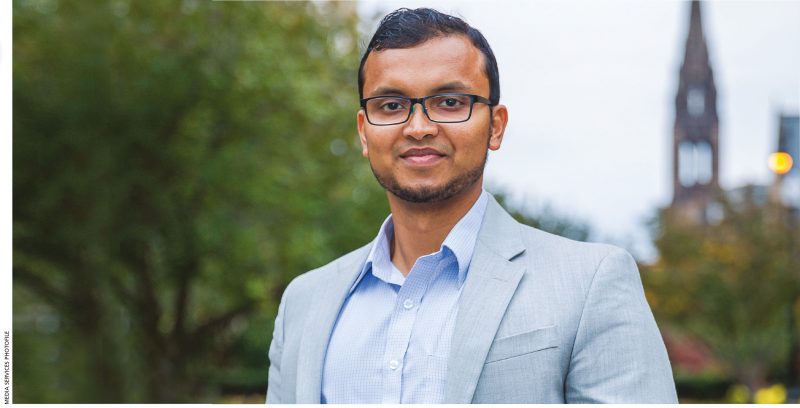SRI LANKANS OVERSEAS
A NEW SPREAD FOR EDUCATION
Hisham Mabrook says that democratising education is a priority

Q: How do you perceive Sri Lanka in the context of progress in the postwar era?
A: It has great fundamentals – leading development and health indicators, a strategic geographical location and a wide range of tourism attractions.
Sri Lanka has done quite well in pivoting to the postwar era but more can be done.
The country needs to make better decisions about strategic assets such as the harbours. It needs to simplify commercial rules and create incentives to spur business, innovation and entrepreneurship. For example, the process for registering a non-profit is tedious and onerous compared to the US.
Sri Lanka also needs to hold itself accountable and not let the country relapse into sectarian conflict given the wave of violence committed against minorities in the past few years.
Lastly, good progress has been made in infrastructure development and this must continue to be a priority. Sri Lanka’s railroads date back to colonial times and a subway system is non-existent. The country is over-reliant on buses that clog the roads.
All this comes with a toll on the economy and constraints on realising the full potential of tourism.

Q: How do your compatriots in the United States view Sri Lanka?
A: Anecdotally, many of my friends visit and love Sri Lanka as a tourism destination. Those who have travelled the rest of South Asia usually comment on the relative cleanliness of the country, the diverse tourism sites and how courteous the locals generally are.
Speaking about Americans in general, I don’t believe that Sri Lanka is very high on most people’s holiday destination lists. Sri Lanka simply doesn’t possess the brand recognition that destinations such as Bali, Thailand or Cambodia enjoy. It needs to invest more on PR and brand building to remedy this.
Q: What were your impressions of Sri Lanka on your last visit – and have they changed from the past?
A: I’ve been visiting Sri Lanka at least once a year since leaving the country in the mid-2000s to study at university. It’s been great to see the country change with the pervasive security checkpoints gone, tech entrepreneurship beginning to mushroom and tourism booming.
On the other hand, certain things haven’t changed. Bribery and corruption is still rife. I recently tried to obtain a driver’s licence and was asked to pay up to expedite the process!
The airport continues to brim with low skilled labourers travelling to and from the Middle East. This is worrisome, given that half the country’s foreign remittances come from these workers.
And there is a major long-term risk to this income source given macroeconomic trends around fossil fuels, policy shifts towards protectionism, the strain on national budgets from elevated geopolitical risks and other cultural changes such as Saudi Arabia permitting women to drive. We need to plan for a future where these workers are not among our key forex earners.
Q: How do you view the brain drain? Why is there still no reversal of it in your opinion?

A: My hypothesis is that it begins with the lack of sufficient high calibre and affordable tertiary education seat capacity in the country.
State universities are limited and extremely selective, taking in only a fraction of graduating high schoolers. This leads to two problems.
Firstly, it pushes students who can afford it to consider education options abroad and many of them ultimately choose to live overseas. Secondly, it creates a dearth of skilled labour in the country despite stellar basic literacy rates. This in turn poses a challenge to attract MNCs to set up shop locally for value added services and manufacturing, which are critical if we are to create well-paid jobs so that expatriates can return to their land of birth.
As a country, Sri Lanka needs to be okay with the privatisation of education – of course well regulated under the Ministry of Education. This will ultimately enable it to compete globally for value added industries rather than as a low-cost labour pool.
Q: What must be done to entice Sri Lankans living overseas to contribute or return to the country?
A: In addition to what I’ve already mentioned, one of the many factors that could help would be for the government to reconsider making it easier for expatriates to gain dual citizenship. I’d wager that most would make the economically expedient choice. With dual citizenship, there’s a vested connection to Sri Lanka, which is broadly in the country’s best interest.
I’d like to see bolstered alumni associations take off, mirroring the practice of US schools. This is a great way to engage alumni across the world, and enable them to participate in the success of others – and ultimately, the country. We have been experimenting with this at Elizabeth Moir School by setting up the Moir Alumni Scholarship Trust.
Q: So what should Sri Lanka focus on most in the coming decade?
A: Firstly, I’d reiterate the importance of democratising higher education and investing in human capital. In addition, Sri Lanka needs to right size the government and public sector, and drive out cronyism and bribery.
It needs to invest in fully monetising the island’s strategic location through its ports and tourism potential with infrastructure development, branding and so on. Lastly, Sri Lanka needs to think about clean energy alternatives given how susceptible it is to fossil fuel markets.





